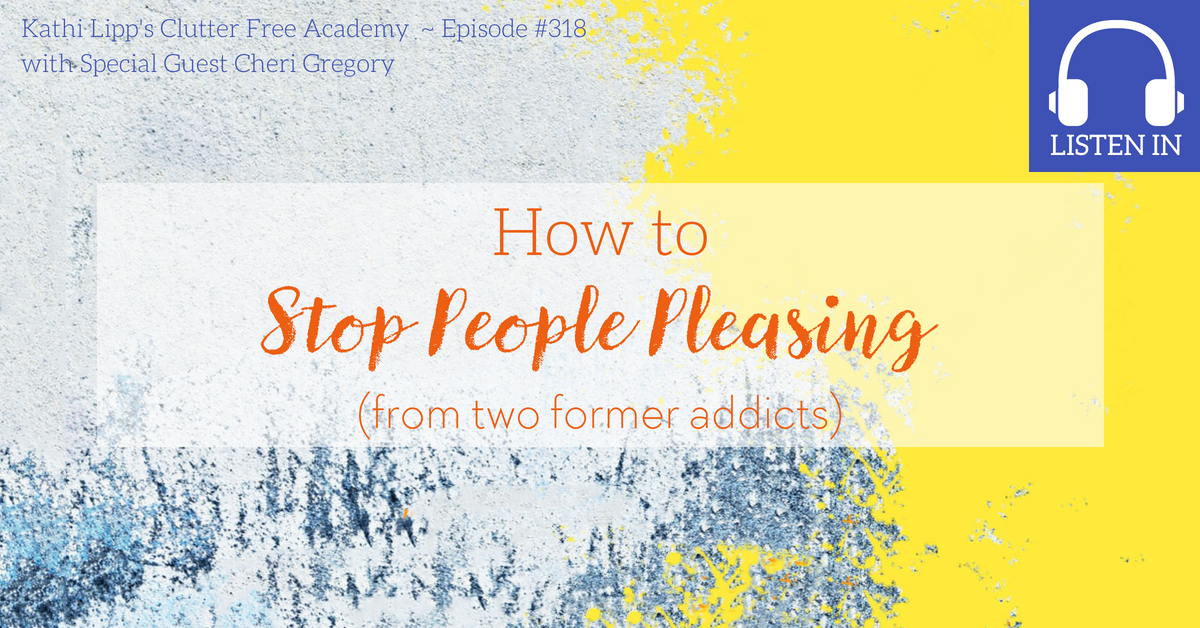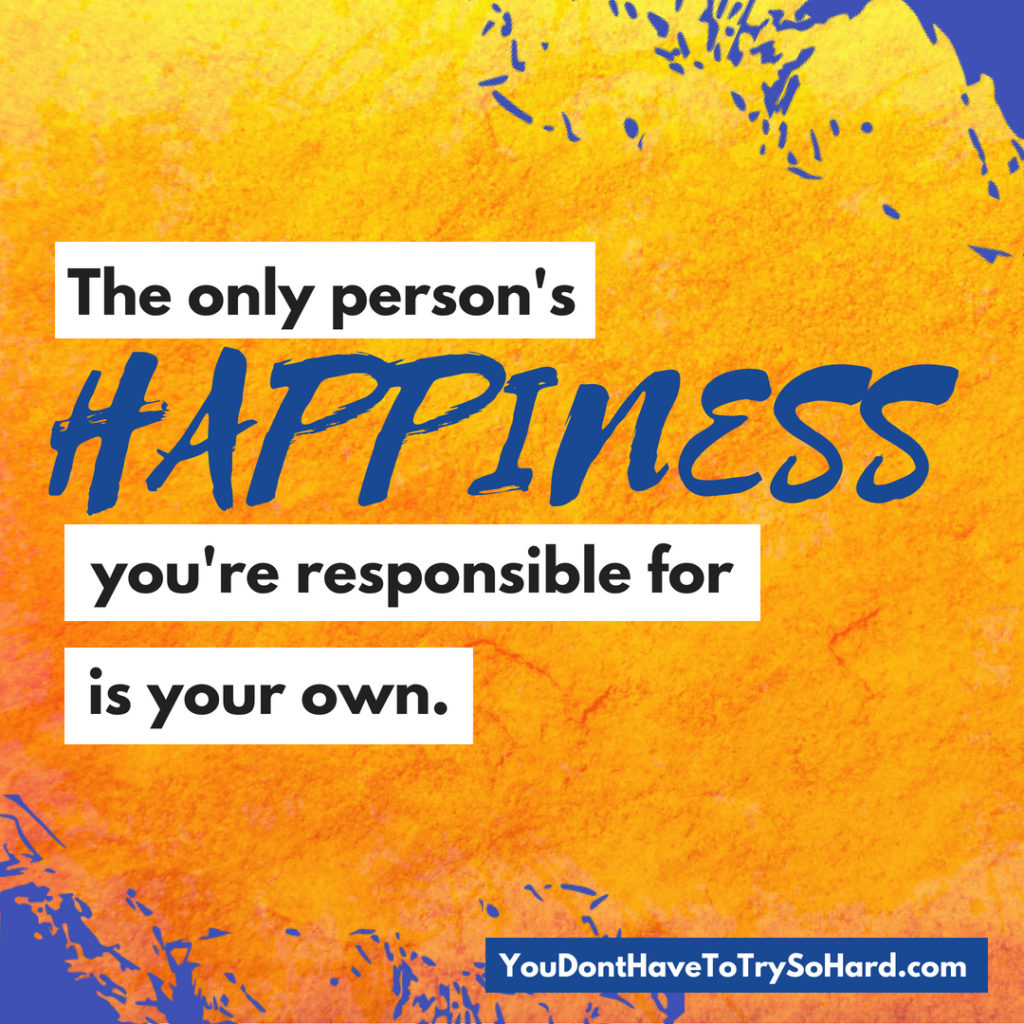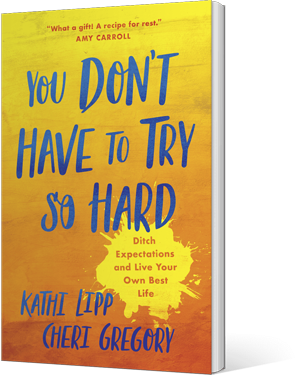Kathi Lipp:
Welcome to Clutter Free Academy where our heart is to help you take small do-able steps to live every day with less Clutter and more life. These four weeks are all about the emotional clutter. But I’ll just say, of all the cluttering topics that we’re talking about, this is the one that’s going to lead you to the most physical clutter. Today we’re talking about the “p word”—procrastination—the hardest one of all. Here with me today is Cheri Gregory, co-author of “You Don’t Have to Try so Hard”. Welcome back to Clutter Free Academy, Cheri.
So Cheri, how has procrastination shown up in your life?
Cheri Gregory:
Thanks for having me. Of course I’m more of the classic perfectionist where I will kill myself to get things done, but the procrastination shows up when I feel like something is so overwhelming. The performance the part of me is all or nothing. I either have to do it amazingly or not at all, and so this procrastination is, “Well, right now I don’t have time to do it all and do it perfectly, thus I won’t do anything at all,” so I won’t even start unless I can keep it going. I know some of your people in Clutter Free Academy feel like they can’t start doing the physical decluttering if they can’t do it all at once, and so I know that that’s where some of your guidance with the blue tape and the fifteen minute time-boxing makes such a big difference for them.
Kathi:
I think that’s because they’ve started before and they haven’t finished. Then it’s been more of a mess than when they started, so that’s why we say in twenty minutes–fifteen minutes of de-cluttering and five minutes of putting away–it’s only going to look better. There’s another de-cluttering system out there that just makes me crazy because you’re supposed to de-clutter by putting everything in the middle of a room. Oh my goodness, that’s the worst thing I’ve ever heard in my entire life! I hope it works for people but it does not work for me. I need to do short, small, doable bits, and the funny thing is, well the not so funny thing, is that you and I have both talked about this type of procrastination being the most socially acceptable. Perfectionistic people don’t see this as perfectionism. So it’s mental.
Cheri:
Right! I’ve actually spoken on this, and had women walk by later and say, “I’ve never thought of procrastination before as perfectionism!” But I think it’s the mindset of, “If I can’t do it right, I’m not going to do it at all. I’m not even going to get started!” So people are constantly putting off tasks until there’s a better time, or a better time they can do it right or they can do it perfectly. The problem with that is that the fear builds up. At least for me, if I put it off for three days, there must be a good reason. If I put it off for three weeks, it must be the biggest baddest monster that I can possibly imagine! Whereas, when we just get started, we shrink can it down to size.
You’ve probably told a few of those stories! You know, when a person tells a grand procrastination story and then says they pulled it off at the last possible moment—and the crowd goes wild! We love these stories! We think they’re just marvelous! The stories are funny and crowd-pleasing. But nobody ever says, “That’s so irresponsible! Why would you tell that story at a party?”
Kathi:
I grew up with a mom whose motto was, “I work better under pressure.” It took me a long time to figure out that no, she didn’t work better under pressure, she just worked. My mom was always busy, but when there was a deadline, and we’re all better with a deadline, she worked harder. That’s not a bad thing you know. I’m noticing as I’m doing more de-cluttering around my house, when I’m doing it with the mission of having people spend the night or something like that, of course I’m going to work harder. It’s more about understanding those little rewards those little goals that help us so much.
So, how do you know if you’re a procrastinator? Perhaps you are if you put off listening to this podcast for three weeks because you didn’t have time! But we all know if this is something we do.
But there are pain points. The number one for me for a long time was that I was always apologizing but nobody cared. People would think, “Yep, we know Kathi, we know you said you were going to do it and you didn’t do it on time.” My mom loves to tell the tale of the library fines I had, because it was always easier to find the library books later on. I was the worst! She says, “I can’t believe they didn’t have a ‘Most Wanted’ poster up there for you.”
I have many people who work for me. I’ve got some who are always on time, and I have some who are sometimes on time and not sometimes on time because things have come up, and then I have people who are always late. The people in the always-late category don’t stick around for very long because we can’t we can’t roll like that.
Cheri:
The second pain point is that you work on things that aren’t important to avoid the pain of difficult tasks. For example, when those of us who work at home on a book deadline find ourselves scrubbing the grout! It is amazing the things that suddenly look so appealing when we want to avoid the one thing that is terrifying us—the thing that we’re afraid of. I think it’s hard sometimes because I don’t recognize it as fear. Instead I’m telling myself that I don’t want to do that, I’m not in the mood today. Or I believe it’s icky. No, it’s fear. I’m afraid of some aspect of the work I’m avoiding, and it is easier for me to go do some other disgusting horrible task that I really don’t like and don’t want to do. That ought to be a sign, when we’re willing to do something we hate doing in order to avoid the other thing.
Kathi:
I see that all the time in myself sadly.
The third pain point is that either people think you’re unreliable, or you kill yourself on a regular basis at the last minute. I’d say I went from being unreliable to thinking, “I’m going to do this whether it kills me,” and let’s be clear, and it kills my husband, it kills my kids, it kills the people I care about because I have a high sense of responsibility now.
Cheri:
The problem is that when you’ve killed yourself and you’ve pulled it off, now you’re behind on the next things that need to be done, and it ends up being this endless cycle of being behind, which looks like procrastination. I think we are all willing to listen to people who have a crisis or an emergency, and at that point that’s a reason to be late or miss a deadline. People can be understanding of that. But when it becomes a pattern then it becomes just excuses.
Kathi:
Yes, and there have been times when all of us have gone through a really tough times in our lives, so please don’t think that we’re short on mercy. It’s the people who keep finding those tough times and using them for the reasons or excuses, and it’s gone on for months or years, that’s when we know.
Cheri:
I have created crises. I have almost knowingly gone without sleep eating too much sugar to get sick so that I could then suddenly cancel out of things or extend deadlines. I’m not above doing such things. I didn’t really intentionally do it in the moment, but in looking back I now see that I pulled a fast one on myself and thus everybody else there.
Kathi:
It’s a way of self-protection really.
What are the three most important things you need to know if you are a procrastinator?
Cheri:
Number one: You’ve got to learn to take care of your future self.
I love how you talk about this future self as being somebody that we need to be loyal to, rather than the immediate gratification. Because avoiding what feels scary in the moment feels fabulous now.
Kathi:
I will say this, my ankle has been hurting quite a bit recently and I’ve been talking about taking care of my future self. I’ve been going to the gym, I’ve been doing long walks, and my ankle has been in pain. At first I thought it was a spider bite because there were two little pinpricks in there. Then I thought it was gout and that I just needed to hustle. I need to do more. It turns out that I have a fractured ankle. So be smart about your future self. Your future self also doesn’t want to be crippled. It’s always a balance of what we need to do today to prepare for the future, but also I need to take care of myself today. So live in that balance and constantly ask yourselves if you’re doing the right thing for today’s self, and for future self. Sometimes you get to just have a break, and it’s okay. You can eat a granola bar and watch an episode of “Gilmore Girls.” That’s OK because that’s restorative and soul filling. But most of the time what we need to be doing is taking care of the things that would be so much easier to put off because they’re hard or scary we don’t want to do them.
Cheri:
Number two: Take the next micro step.
One of the things we’ve been learning over the last few years together is that we would put things on our list and they would just be too big and that was part of what made it so scary. I’m doing better with procrastination these days because all I have to do is look at it and read it and think about it. I don’t have to do it, I don’t have to fix that, I don’t have to do research. I just need to start wrapping my brain around it, and start giving myself permission to just take that first little micro step. What’s astonishing is that when I’d pushed something off until the very last minute, usually I ended up doing a very poor job. I’m not one of those who pulls it off at the last minute very well because generally the projects are more complicated than I thought, they need more research, or there are people I need to talk to who aren’t accessible at two thirty in the morning. But now, if I can at least get started. If I can at least begin by attempting to understand what the project is about, or who I might need to involve, and what questions I might have it helps. Another really good thing about taking those first micro steps is just knowing what questions I might have, and even jotting those down. That’s not a particularly scary thing to do. I don’t have to have a perfect end result. But oh my goodness, it gets the ball rolling and gets some momentum happening. For so many of us who deal with procrastination, once that obstacle of starting is out of the way, then we can keep it going. It’s the big bad beginning that can just be so overwhelming. Micro steps are the answer to that.
Kathi:
And if you are working on a team, procrastination is about the worst thing that you can do. What you’re doing is that you’re asking everybody to constantly be a hero for you, and people are tired of rescuing over and over and over. There are some people who get off on it, but then you end up owing them all the time and nobody wants to live like that. So the earlier I can do something, the less scary it can be, and the more imaginary obstacles I can remove. When we’re looking at a project we either are the total optimists, thinking this is just going to be so easy, and that we think that way. We’re almost scared to start it because we don’t know what the obstacles are going to be. Then we start imagining all the crazy stuff that could happen, so whether you’re an optimist or a pessimist the reward is procrastination. But it’s only a temporary reward. Don’t you feel terrible while you’re procrastinating? Thinking all the while you know you should be doing this.
Cheri:
My conscience goes crazy!
One of the things I have learned over the last years is to start asking myself what my procrastination is trying to protect me from. In my case, it’s often trying to protect me from devoting too much time. My old perfectionistic self would say,” I’m just going to work. I’m going to work and work and work as hard as I can for long as it takes.” I’ve started to recognize when procrastination is actually kind of being friendly towards me, it’s trying to help me cut things down to size. The problem with using procrastination to do that is that I just waste time. I fritter my time away and then there’s only three hours left, so now the task takes three hours. What I’m trying to learn to do is when I feel like procrastinating, which means I was probably about to devote ten hours to a two hour task, is to give myself permission to only take two or maybe three hours maximum, and I’m going to call that good enough. Then I can do whatever I want with that time. I can relax. I can rest. I can go take a walk and spend time with my family. I can watch “Gilmore Girls.” That’s actually been a really interesting little experiment for me to sometimes look at the procrastination as a potentially friendly force that I need to listen to. What is it trying to do for me? In my case it’s trying to curate.
Kathi:
So you can view procrastination as protection.
Cheri:
Yes. Protection from my crazed performance-istic and perfectionist self.
Kathi:
I love that.
Finally, number three: Accountability.
You and I do this big time. It’s good to be able to say when I can feel myself procrastinating and to be able to say what I want to do and when I need to get it done. Michele Cushatt and I text each other every single morning. We tell each other what we’re writing that day because it would be so easy without that accountability to just think that since nobody is going to know I’m not writing, then the only person I’m hurting is myself. That is the worst sentence in the world by the way—that the only person I’m hurting is myself. Why would that be OK?
How do you use accountability in your life Cheri?
Cheri:
You know from working with me all these years that I am a social learner, so collaboration and cooperation are so important to me. Knowing that I’m stewarding not just my time, which should be important to me, but knowing that I’m responsible for these collaborative projects where what I do or don’t do affects somebody else’s ability to be who God created them to be gives me an extra sense of responsibility. It’s not an oppressive sense of responsibility, it’s exciting. It’s OK. Part of what I’ve realized is that I do need constant feedback, and then I’m less likely to procrastinate. For example, for my writing I have writing coach. The moment I have a draft, no matter how bad it is, I send it off to her. Knowing I’m going to hear back from her in a few days—not months or weeks—keeps me writing. I need the instant gratification of accountability.
It keeps me from feeling like nobody cares or it doesn’t matter to anybody in the world whether or not I meet my deadline. It does matter.
Kathi:
It really does. One of the things that has helped me with accountability are the opportunities that I want. I have to be good about going after them and it’s scary and to say, “ Hey, I’m doing a brave thing and I need you to pray for me, I need you to encourage me, I need you to be ridiculously cheering for me, because this is hard for me.” That helps me to not put things off. I’ve got one of those opportunities right now. I need to apply to be a speaker at something and I’m scared. I’m scared of rejection and so to be able to put my best foot forward and be okay with this I need somebody to cheer me on, and it’s been huge for me to ask for this kind of help and accountability.
Now I want to know, what is the thing that you are procrastinating on this week? We all do it. And what’s the step you’re going to take? Is it micro steps? Is it needing to understand that you’re taking care of your future self? Do you need to ask a friend for some help? Tell us the thing you’re scared of and the step you’re going to take so you won’t procrastinate, and we will enter you in to win the “You Don’t Have to Try So Hard” gift basket. There are amazing books that will help you get on the path to doing what you want to do. Go comment over on the podcast page. Cheri, thanks so much for being with me again today!
Cheri:
Thanks for having me!
Kathi:
Next time we’re talking about the mother of all perfectionistic traits. We’re talking about perfectionism itself. I know it’s so scary, but that’s OK, we’ll hold each other’s hands and we’ll be accountable. Thank you for joining us. You’ve been listening to Clutter Free Academy. I’m Kathi Lipp. Now go create the Clutter Free life you were always intended to live.


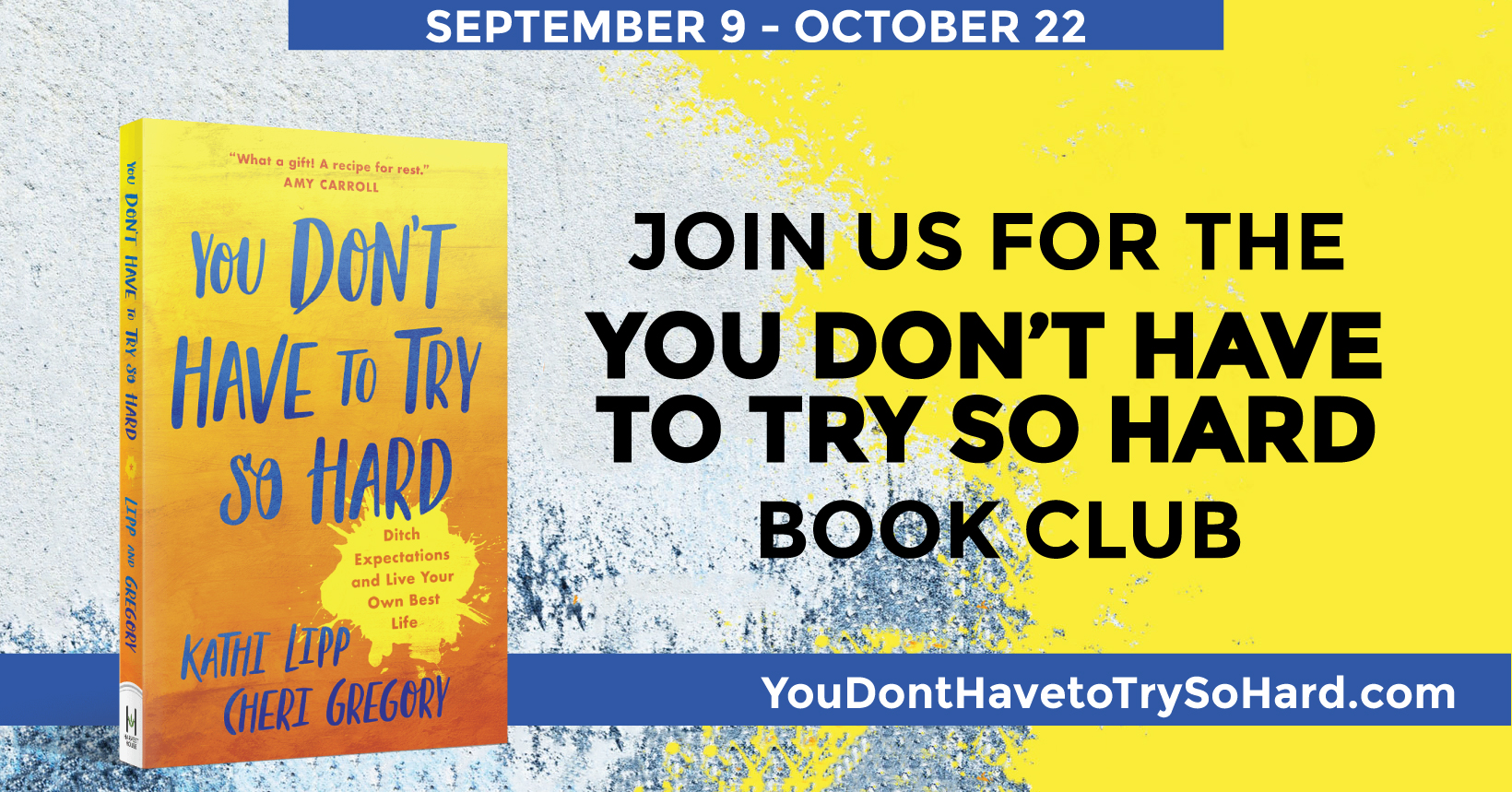


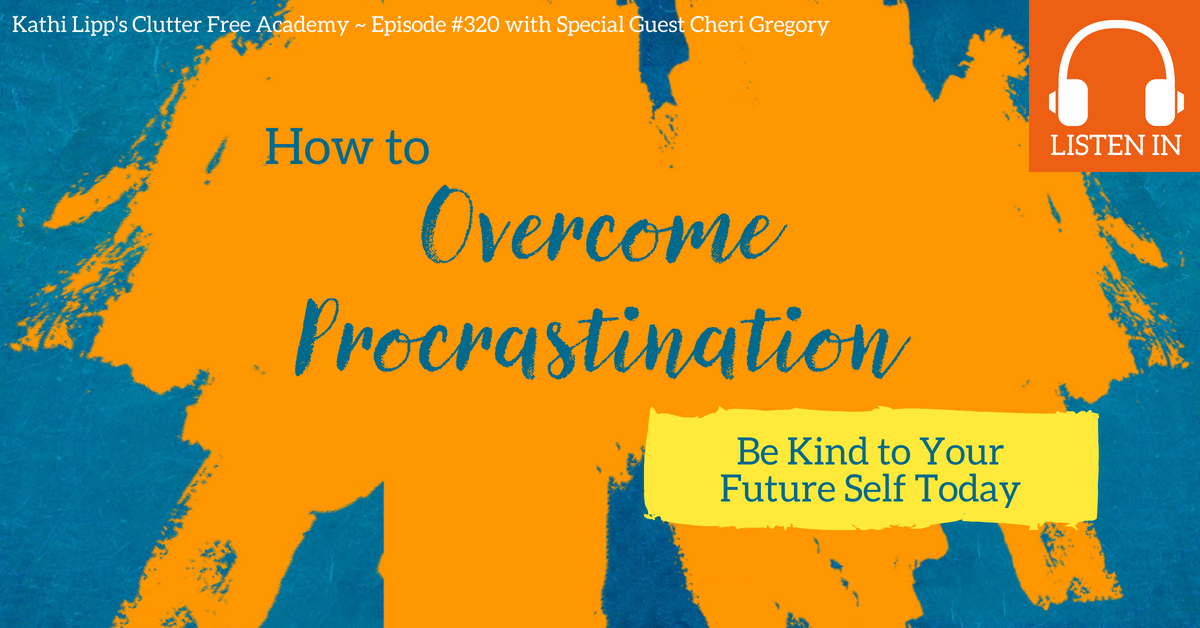

 If you’re committed to really ditching those crazy expectations you’ve put on your life, this book club is for you. We’ll be diving into the concepts of identifying and destroying those bullies that keep us in try-harder living rather than living our best life.
If you’re committed to really ditching those crazy expectations you’ve put on your life, this book club is for you. We’ll be diving into the concepts of identifying and destroying those bullies that keep us in try-harder living rather than living our best life.




